24 start with C start with C
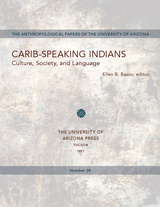

Cartas e Cronicas contains three dozen selections form Brazilian newspapers accompanied by vocabulary lists and comprehension exercises.
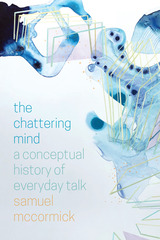
From Plato’s contempt for “the madness of the multitude” to Kant’s lament for “the great unthinking mass,” the history of Western thought is riddled with disdain for ordinary collective life. But it was not until Kierkegaard developed the term chatter that this disdain began to focus on the ordinary communicative practices that sustain this form of human togetherness.
The Chattering Mind explores the intellectual tradition inaugurated by Kierkegaard’s work, tracing the conceptual history of everyday talk from his formative account of chatter to Heidegger’s recuperative discussion of “idle talk” to Lacan’s culminating treatment of “empty speech”—and ultimately into our digital present, where small talk on various social media platforms now yields big data for tech-savvy entrepreneurs.
In this sense, The Chattering Mind is less a history of ideas than a book in search of a usable past. It is a study of how the modern world became anxious about everyday talk, figured in terms of the intellectual elites who piqued this anxiety, and written with an eye toward recent dilemmas of digital communication and culture. By explaining how a quintessentially unproblematic form of human communication became a communication problem in itself, McCormick shows how its conceptual history is essential to our understanding of media and communication today.

How do children learn the intangible rules of conversation? How do they make talk “work”? Adults usually regard talk as a simple means of conveying information. Catherine Garvey’s examination of children’s talk reveals, however, that much more than this goes on in any conversational exchange.
Talk always takes place in a particular situation or context: the speakers are continuously interpreting what is going on, and they adjust their responses accordingly. To be sure that the message is received, children must learn to engage the attention of the other person, to take turns at talking, and to set up signals for the beginning and end of conversation. They learn to confirm that the intended meaning is understood and to evaluate the acceptability of the message, and they acquire an understanding of the ritual aspects of talk, including marks of courtesy such as “please” and “thank you,” displays of attentiveness, and an awareness of interpersonal status. Children must also learn to say “no,” to use talk to reach a goal, and to interpret the differences in the ways other people talk.
Garvey explains the importance of talk to children’s socialization and development and shows why talk is an integral and revealing part of the child’s life that reflects important changes in thinking and social interaction.
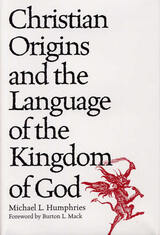
Traditionally, scholars have traced the origin of Christianity to a single source—the kingdom of God as represented in the message of the historical Jesus. Through a rhetorical critical analysis of one of the most important texts in early Christian literature (the Beelzebul controversy), Michael L. Humphries addresses the issue of Christian origins, demonstrating how the language of the kingdom of God is best understood according to its locative or taxonomic effect where the demarcation of social and cultural boundaries contributes to the emergence of this new social foundation.
The Beelzebul controversy exists in two versions— Q and Mark—and thereby allows the study to engage the import of the kingdom language at the point of juxtaposition between two distinct textual representations. This makes it possible to deal directly with the issue of the disparity of texts in the synoptic tradition. Humphries suggests that these two versions of the same controversy indicate two distinct social trajectories wherein the kingdom of God comes to mean something quite different in each case but that nevertheless they demonstrate a similarity in theoretical effect where the language contributes to the emergence of relatively distinct social formations.
Humphries establishes the Q and Markan versions of the Beelzebul controversy as relatively sophisticated compositions that are formally identified as elaborate chreiai (a literary form used in the teaching of rhetoric at the secondary and post-secondary level of GrecoRoman education) and that offer an excellent example of the rhetorical manipulation of language in the development of social and cultural identity.
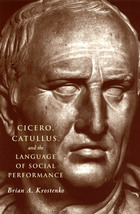
As Krostenko demonstrates, a key feature of this language is its capacity to express both approval and disdain—an artifact of its origins at a time when the "style" and "charm" of imported Greek cultural practices were greeted with both enthusiasm and hostility. Cicero played on that ambiguity, for example, by chastising lepidus ("fine") boys in the "Second Oration against Catiline" as degenerates, then arguing in his De Oratore that the successful speaker must have a certain charming lepos ("wit"). Catullus, in turn, exploited and inverted the political subtexts of this language for innovative poetic and erotic idioms.
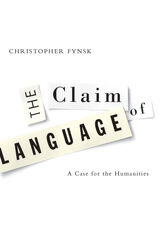
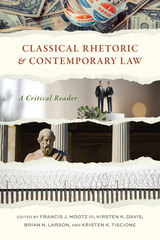
Pairs passages from works of classical rhetoric with contemporary legal rulings to highlight and analyze their deep and abiding connections in matters of persuasion
Classical Rhetoric and Contemporary Law: A Critical Reader is a rich work that analyzes the interplay between ancient rhetorical traditions and modern legal practice, reestablishing the lost connections between law and classical rhetoric. From Isocrates’s Panegyricus in 380 BCE to the landmark US Supreme Court case Trump v. Hawaii in 2018, and from Antiphon’s fifth century BCE First Tetralogy to 1995’s O. J. Simpson trial, the volume draws on an array of sources to illuminate how ancient rhetorical insights may even today challenge and enrich our grasp of contemporary legal principles.
The collection opens with a brisk review of the historical development of rhetoric. The second part examines a pair of rhetorical theorists whose works frame the period across which classical rhetoric declined as a mode of thought. A contemporary appellate case contrasts with the work of Giambattista Vico, an eighteenth-century professor of rhetoric who warned of the separation of law from rhetoric. The analysis of the work of twentieth-century scholars Chaïm Perelman and Lucie Olbrects-Tyteca shows that where Cartesian rationality fails, the humanistic tradition of rhetoric allows the law to respond to the needs of justice. In the third part, ten case studies bring together a classical rhetorical theorist with a contemporary court case, demonstrating the abiding relevance of the classical tradition to contemporary jurisprudence.
With its cross-disciplinary appeal, Classical Rhetoric and Contemporary Law encompasses the work of legal, rhetorical, English, and communication scholars alike, catalyzing interactive exploration into the profound ways ancient rhetorical insights continue to shape our comprehension of today’s legal landscape.
CONTRIBUTORS
Vasileios Adamidis / Elizabeth C. Britt / Kirsten K. Davis / David A. Frank / Michael Gagarin / Eugene Garver / Mark A. Hannah / Catherine L. Langford / Brian N. Larson / Craig A. Meyer / Francis J. Mootz III / Susan E. Provenzano / Nick J. Sciullo / Kristen K. Tiscione / Laura A. Webb
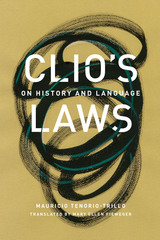
Offering a unique perspective on the very notions and practices of storytelling, history, memory, and language, Clio’s Laws collects ten essays (some new and some previously published in Spanish) by a revered voice in global history. Taking its title from the Greek muse of history, this opus considers issues related to the historian’s craft, including nationalism and identity, and draws on Tenorio-Trillo’s own lifetime of experiences as a historian with deep roots in both Mexico and the United States. By turns deeply ironic, provocative, and experimental, and covering topics both lowbrow and highbrow, the essays form a dialogue with Clio about idiosyncratic yet profound matters.
Tenorio-Trillo presents his own version of an ars historica (what history is, why we write it, and how we abuse it) alongside a very personal essay on the relationship between poetry and history. Other selections include an exploration of the effects of a historian’s autobiography, a critique of history’s celebratory obsession, and a guide to reading history in an era of internet searches and too many books. A self-described exile, Tenorio-Trillo has produced a singular tour of the historical imagination and its universal traits.
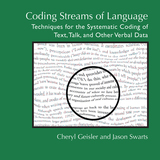
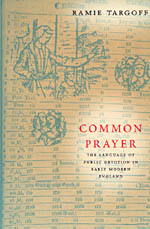
Through readings of William Shakespeare's Hamlet, Richard Hooker's Lawes of Ecclesiastical Politie, Philip Sidney's Apology for Poetry and his translations of the Psalms, John Donne's sermons and poems, and George Herbert's The Temple, Targoff uncovers the period's pervasive and often surprising interest in cultivating public and formalized models of worship. At the heart of this study lies an original and daring approach to understanding the origins of devotional poetry; Targoff shows how the projects of composing eloquent verse and improving liturgical worship come to be deeply intertwined. New literary practices, then, became a powerful means of forging common prayer, or controlling private and otherwise unmanageable expressions of faith.
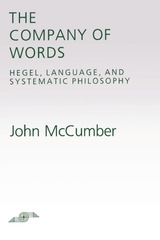
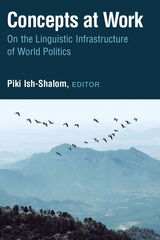
Concepts are socially and linguistically constructed and used for multiple purposes, such as justifying war in the name of democracy; or, using the idea of democracy to resist Western intervention and influence. In this fascinating and novel edited collection, Piki Ish-Shalom and his team of authors interrogate the “conceptions of concepts” in international relations. Using theoretical frameworks from Gramsci and Bourdieu, among others, the authors show that not interrogating the meaning of the language we use to talk about international relations obscures the way we understand (or portray) IR. The authors examine self-determination, winning in war, avoidance of war, military design and reform agenda, vagueness in political discourse, “blue economy,” friendship, and finally, the very idea of the “international community” itself. As the author asserts, Bourdieu’s sociology of field and Gramsci’s political theory combined “offer us a sociopolitical theory of relations of power and domination concealed by doxic knowledge and taken-for-granted rules, in which essential contested concepts and political-serving conceptions can and do play an important role.”
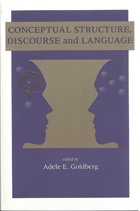
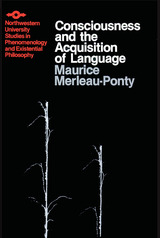
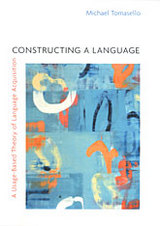
In this groundbreaking book, Michael Tomasello presents a comprehensive usage-based theory of language acquisition. Drawing together a vast body of empirical research in cognitive science, linguistics, and developmental psychology, Tomasello demonstrates that we don’t need a self-contained “language instinct” to explain how children learn language. Their linguistic ability is interwoven with other cognitive abilities.
Tomasello argues that the essence of language is its symbolic dimension, which rests on the uniquely human ability to comprehend intention. Grammar emerges as the speakers of a language create linguistic constructions out of recurring sequences of symbols; children pick up these patterns in the buzz of words they hear around them.
All theories of language acquisition assume these fundamental skills of intention-reading and pattern-finding. Some formal linguistic theories posit a second set of acquisition processes to connect somehow with an innate universal grammar. But these extra processes, Tomasello argues, are completely unnecessary—important to save a theory but not to explain the phenomenon.
For all its empirical weaknesses, Chomskian generative grammar has ruled the linguistic world for forty years. Constructing a Language offers a compellingly argued, psychologically sound new vision for the study of language acquisition.

A new history shows how FDR developed a vision of national security focused not just on protecting Americans against physical attack but also on ensuring their economic well-being—and how the nascent conservative movement won the battle to narrow its meaning, durably reshaping US politics.
Americans take for granted that national security comprises physical defense against attacks. But the concept of national security once meant something more. Franklin Roosevelt’s vision for national security, Peter Roady argues, promised an alternate path for the United States by devoting as much attention to economic want as to foreign threats. The Contest over National Security shows how a burgeoning conservative movement and power-hungry foreign policy establishment together defeated FDR’s plans for a comprehensive national security state and inaugurated the narrower approach to national security that has dominated ever since.
In the 1930s, Roosevelt and his advisors, hoping to save the United States from fascism and communism, argued that national security entailed protection from both physical attack and economic want. Roosevelt’s opponents responded by promoting a more limited national security state privileging military defense over domestic economic policy. Conservatives brought numerous concerns to bear through an enormous public relations offensive, asserting not just that Roosevelt’s plans threatened individual freedom but also that the government was less competent than the private sector and incapable of delivering economic security.
This contest to define the government’s national security responsibilities in law and in the public mind, Roady reveals, explains why the United States developed separate and imbalanced national security and welfare states, with far-reaching consequences. By recovering FDR’s forgotten vision, Roady restores a more expansive understanding of national security’s meanings as Americans today face the great challenges of their times.
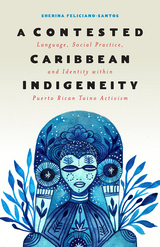
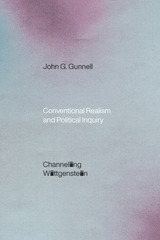
John G. Gunnell argues for conventional realism as a theory of social phenomena and an approach to the study of politics. Drawing on Wittgenstein’s critique of “mentalism” and traditional realism, Gunnell argues that everything we designate as “real” is rendered conventionally, which entails a rejection of the widely accepted distinction between what is natural and what is conventional. The terms “reality” and “world” have no meaning outside the contexts of specific claims and assumptions about what exists and how it behaves. And rather than a mysterious source and repository of prelinguistic meaning, the “mind” is simply our linguistic capacities. Taking readers through contemporary forms of mentalism and realism in both philosophy and American political science and theory, Gunnell also analyzes the philosophical challenges to these positions mounted by Wittgenstein and those who can be construed as his successors.
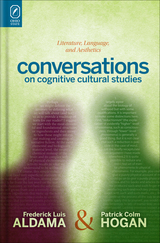
With clarity and learning, Aldama and Hogan consider five central topics at the intersection of literature and cognitive science. They begin with the fundamental question of the nature of the self. From here, they turn to language, communication, and thought before moving on to the central issue of the structure and operation of narrative. The book concludes with thought-provoking explorations of aesthetics and politics. Illustrating their arguments with work that ranges from graphic fiction and popular cinema to William Faulkner and Bertolt Brecht, Aldama and Hogan leave the reader with a clear sense of what cognitive cultural studies have already achieved and the significant promise the discipline holds for the future.

A major new work by Charles Taylor: the long-awaited follow-up to The Language Animal, exploring the Romantic poetics central to his theory of language.
The Language Animal, Charles Taylor’s 2016 account of human linguistic capacity, was a revelation, toppling scholarly conventions and illuminating our most fundamental selves. But, as Taylor noted in that work, there was much more to be said. Cosmic Connections continues Taylor’s exploration of Romantic and post-Romantic responses to disenchantment and innovations in language.
Reacting to the fall of cosmic orders that were at once metaphysical and moral, the Romantics used the symbols and music of poetry to recover contact with reality beyond fragmented existence. They sought to overcome disenchantment and groped toward a new meaning of life. Their accomplishments have been extended by post-Romantic generations into the present day. Taylor’s magisterial work takes us from Hölderlin, Novalis, Keats, and Shelley to Hopkins, Rilke, Baudelaire, and Mallarmé, and on to Eliot, Miłosz, and beyond.
In seeking deeper understanding and a different orientation to life, the language of poetry is not merely a pleasurable presentation of doctrines already elaborated elsewhere. Rather, Taylor insists, poetry persuades us through the experience of connection. The resulting conviction is very different from that gained through the force of argument. By its very nature, poetry’s reasoning will often be incomplete, tentative, and enigmatic. But at the same time, its insight is too moving—too obviously true—to be ignored.
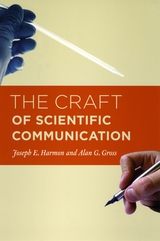
The ability to communicate in print and person is essential to the life of a successful scientist. But since writing is often secondary in scientific education and teaching, there remains a significant need for guides that teach scientists how best to convey their research to general and professional audiences. The Craft of Scientific Communication will teach science students and scientists alike how to improve the clarity, cogency, and communicative power of their words and images.
In this remarkable guide, Joseph E. Harmon and Alan G. Gross have combined their many years of experience in the art of science writing to analyze published examples of how the best scientists communicate. Organized topically with information on the structural elements and the style of scientific communications, each chapter draws on models of past successes and failures to show students and practitioners how best to negotiate the world of print, online publication, and oral presentation.

On names, forms, beauty, and lies.
Plato, the great philosopher of Athens, was born in 427 BC. In early manhood an admirer of Socrates, he later founded the famous school of philosophy in the grove Academus. Much else recorded of his life is uncertain; that he left Athens for a time after Socrates’ execution is probable; that later he went to Cyrene, Egypt, and Sicily is possible; that he was wealthy is likely; that he was critical of “advanced” democracy is obvious. He lived to be 80 years old. Linguistic tests including those of computer science still try to establish the order of his extant philosophical dialogues, written in splendid prose and revealing Socrates’ mind fused with Plato’s thought.
In Laches, Charmides, and Lysis, Socrates and others discuss separate ethical conceptions. Protagoras, Ion, and Meno discuss whether righteousness can be taught. In Gorgias, Socrates is estranged from his city’s thought, and his fate is impending. The Apology (not a dialogue), Crito, Euthyphro, and the unforgettable Phaedo relate the trial and death of Socrates and propound the immortality of the soul. In the famous Symposium and Phaedrus, written when Socrates was still alive, we find the origin and meaning of love. Cratylus discusses the nature of language. The great masterpiece in ten books, the Republic, concerns righteousness (and involves education, equality of the sexes, the structure of society, and abolition of slavery). Of the six so-called dialectical dialogues Euthydemus deals with philosophy; metaphysical Parmenides is about general concepts and absolute being; Theaetetus reasons about the theory of knowledge. Of its sequels, Sophist deals with not-being; Politicus with good and bad statesmanship and governments; Philebus with what is good. The Timaeus seeks the origin of the visible universe out of abstract geometrical elements. The unfinished Critias treats of lost Atlantis. Unfinished also is Plato’s last work, Laws, a critical discussion of principles of law which Plato thought the Greeks might accept.
The Loeb Classical Library edition of Plato is in twelve volumes.
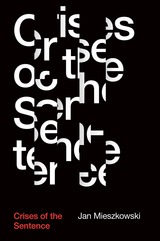
To understand what is at stake in thinking—or not thinking—about the sentence, Jan Mieszkowski looks at the difficulties confronting nineteenth- and twentieth-century authors when they try to explain what a sentence is and what it can do. From Romantic debates about the power of the stand-alone sentence, to the realist obsession with precision and revision, to modernist experiments with ungovernable forms, Mieszkowski explores the hidden allegiances behind our ever-changing stylistic ideals. By showing how an investment in superior writing has always been an ethical and a political as well as an aesthetic commitment, Crises of the Sentence offers a new perspective on our love-hate relationship with this fundamental compositional category.
READERS
Browse our collection.
PUBLISHERS
See BiblioVault's publisher services.
STUDENT SERVICES
Files for college accessibility offices.
UChicago Accessibility Resources
home | accessibility | search | about | contact us
BiblioVault ® 2001 - 2024
The University of Chicago Press









